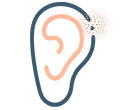Mathur, P., & Yang, J. (2015). Usher syndrome: Hearing loss, retinal degeneration and associated abnormalities. Biochimica et biophysica acta, 1852(3), 406–420. https://doi.org/10.1016/j.bbadis.2014.11.020
Jouret, G., Poirsier, C., Spodenkiewicz, M., Jaquin, C., Gouy, E., Arndt, C., Labrousse, M., Gaillard, D., Doco-Fenzy, M., & Lebre, A. S. (2019). Genetics of Usher Syndrome: New Insights From a Meta-analysis. Otology & neurotology : official publication of the American Otological Society, American Neurotology Society [and] European Academy of Otology and Neurotology, 40(1), 121–129. https://doi.org/10.1097/MAO.0000000000002054
Toms, M., Pagarkar, W., & Moosajee, M. (2020). Usher syndrome: clinical features, molecular genetics and advancing therapeutics. Therapeutic advances in ophthalmology, 12, 2515841420952194. https://doi.org/10.1177/2515841420952194
Géléoc, G., & El-Amraoui, A. (2020). Disease mechanisms and gene therapy for Usher syndrome. Hearing research, 394, 107932. https://doi.org/10.1016/j.heares.2020.107932
Wolfrum, U., & Nagel-Wolfrum, K. (2018). Das Usher-Syndrom, eine Ziliopathie des Menschen [The Usher Syndrome, a Human Ciliopathy]. Klinische Monatsblatter fur Augenheilkunde, 235(3), 273–280. https://doi.org/10.1055/a-0573-9431





